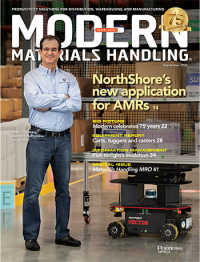Fresh food, anyone? RPCs protect in the supply chain
It’s no small feat to protect sandwiches, snacks and other single-serving food items on their way to a store. But it’s an even better story when the mini plastic containers providing the protection are part of a sustainable, circular supply chain.
A fresh sandwich has a lot going for it. Potentially. Unfortunately, a lot can happen between the time it’s made at a remote location and it goes on display at a grocery or big box store. Getting crushed is one possible indignity. So is a rip in the packaging. Sandwiches that have either happen to them are called “waste.”
“With perishables, you always want the food protected,” explains Bryan Tate, vice president of product and category development for IFCO Systems U.S. As he explains, stores are becoming more acutely aware of the importance of protecting individual fresh food items from sandwiches to dairy and snacks throughout the supply chain.
Tate says some of this is driven by consumers interested in easy access to fresh food. Less waste isn’t so bad for the stores, either.
Earlier this year, IFCO introduced a reusable plastic container (RPC) mini to help with those challenges. These rigid, polypropylene RPCs are small, measuring 11.8 by 7.8 by 6.6 inches. And from initial indications, they are getting the job done on the front end of the supply chain. They even save space in over-the-road transport, trimming fuel costs.
But what’s just as interesting is that these mini containers are reusable, too.
You’ve heard of pallet pools. Well, IFCO has an RPC pool going here. The RPC mini is just the latest addition to the company’s 314 million fresh food RPCs already in circulation. An RFID chip tracks each container as it moves through what is a completely circular supply chain with a very low asset loss rate, Tate says.
Once a container arrives at the store and is unpacked of its sandwich or treat, the return trip begins. First, the retailer collapses each container down to 1 inch in height. Then the minis are collected and shipped to IFCO’s North American service center network for processing.
There, containers are unpacked and sanitized. “Anything sanitized is very popular right now. Furthermore, IFCO certifies its process to provide customers peace of mind,” says Tate. Mini RPCs are then shipped to the location where they are filled again with fresh food prior to shipment to the retailer.
That all sounds like a pretty interesting proposition. To begin, sustainability comes in various forms from simple reusability of the mini containers to an expected life of 10 years, says Tate. There’s also protection of the food during transport.
Containers can be used to display the fresh food in the store from refrigerated to an end-of-aisle display. They may even show up in convenience stores one day. Meanwhile, just out of curiosity, you’ll probably start looking for these mini RPCs at your local stores. And when you find one, you can tell a friend the back story of how that sandwich got there in the first place.

Article Topics
Columns News & Resources
New resource center for weighing and dimensioning Protective packaging roundup MODEX C-Suite Q&A: Troy Donnelly, Senior VP of Sales, Marketing, and Application, DMW&H When Just-in-Time Just Doesn’t Work Recycling coastline plastic into premium reusable packaging Fresh food, anyone? RPCs protect in the supply chain Why Isn’t Your Loading Dock Connected to Your Supply Chain? More ColumnsLatest in Materials Handling
Beckhoff USA opens new office in Austin, Texas Manhattan Associates selects TeamViewer as partner for warehouse vision picking ASME Foundation wins grant for technical workforce development The (Not So) Secret Weapons: How Key Cabinets and Asset Management Lockers Are Changing Supply Chain Operations MODEX C-Suite Interview with Harold Vanasse: The perfect blend of automation and sustainability Consultant and industry leader John M. Hill passes on at age 86 Registration open for Pack Expo International 2024 More Materials HandlingSubscribe to Materials Handling Magazine

Find out what the world's most innovative companies are doing to improve productivity in their plants and distribution centers.
Start your FREE subscription today.
April 2024 Modern Materials Handling

Latest Resources












